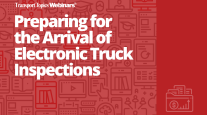Opinion: Setting Aside? Count Trucking In.
By John Byrne
Vice President and CEO
Byrne Transportation Services LLC
This Opinion piece appears in the March 28 print edition of Transport Topics. Click here to subscribe today.
The U.S. transportation industry, which contains many hundreds of small businesses among the sizable firms, has a government champion: the Small Business Administration.
For more than half a century, the Small Business Administration has focused on getting the small firms a share of the action when a government agency or a government contractor purchases goods and services. This is a sizable amount of spending: According to the SBA, the figure for fiscal year 2008 was $550 billion.
In a perfect SBA world, 23% of that amount — more than $126.5 billion in fiscal year 2008 math — would be spent on the services and products provided by organizations defined as “small.”
There’s another math that takes effect in the event that a government contractor fails to meet or exceed the 23% requirement: Fines can be onerous.
Good as it can be for a company to prevail in a competition for a government project with a value greater than $650,000, the success comes with a serious obligation and some peril. The company has to fulfill its contract at the proper level of quality at the right time — while allocating at least 23% of the total spending, at least $149,500 — for purchase of services and goods from small businesses.
Fall short of the 23% mark and incur a significant fine. Purchase goods and services from firms with inferior abilities and incur the risk of fines for failure to meet obligations of quality and completion date.
The peril is the same for governmental units. While conscientiously managing the sourcing of services so that small businesses in various categories have an opportunity to participate, the agency itself has to blend the providers together so that the full project is successful. Categories of small business are:
• Veteran-owned.
• Woman-owned.
• Businesses owned by someone with a disability.
• Businesses with a principal office in a HUBZone (historically underutilized business area).
• Businesses whose owners are members of socially and economically disadvantaged groups.
• Businesses that provide environmental products and services.
Within the 23% figure are allocations for small businesses holding additional credentials.
The good intentions of Congress over the years and the determined work of the SBA have produced great opportunity for small businesses — sometimes an opportunity so great that the small company could transform itself into a large company. But because of the potential fines and the new level of risk introduced in fulfillment of the base contract, the good intentions still add to the problems of a big company meeting a big obligation.
The transportation industry, from trucking to barge, from rail to air, can help. If the transportation industry increases its participation, big contractors and many small businesses will benefit at the same time.
The reason can seem counterintuitive. The transportation industry is full of small businesses that are not really so tiny. They are able to meet obligations and provide the good management processes that give big companies comfort.
Most important, the very service provided by the transportation industry legitimately qualifies for recording against the 23% allocation for small business spending.
Pretty sweet, huh?
Transportation expenditure is seldom absent from the costs of fulfilling a contract; yet big companies and government agencies have concentrated on meeting their 23% requirement by purchasing manufacturing services from authorized small businesses. At times, this has meant obtaining important goods at precise times from an illogical number of piecemeal providers — each one a small business but none of the businesses large enough to provide sufficient service for a real effect on the fulfillment of the contract or satisfaction of the 23% requirement.
In contrast, the normal spending on transportation — for importing raw materials, conducting inter-plant movements and delivering finished product — is a sizable need that can be met by transportation companies.
Contractors that have turned their attention to their transportation expenses have found a fine way of meeting the 23% mark while contributing to the quality and precise timing promised in a master contract. Contractors that have recognized the use of their transportation spending for compliance have developed ways of using the amount. For example, contractors have reserved a certain portion of their transportation spending for a small business provider whose capabilities are still large enough to provide a significant level of service supported by the systems integration and other processes familiar to a big company.
The solution comes with a very attractive feature: The government agency or the government contractor doesn’t have to change the level of spending. All the buyer has to do is remember that transportation services count. The small business with the proper credentials and a big-company scope of abilities can move the goods — and have a beneficial effect on compliance with the set-aside requirements.
Byrne Transportation Services LLC, Warrenville, Ill., is a veteran-owned transportation broker experienced in government contracts.


